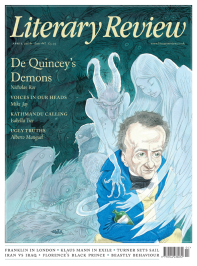Gulliver Ralston
Beware the Shoe Removers
Beethoven for a Later Age: The Journey of a String Quartet
By Edward Dusinberre
Faber & Faber 262pp £18.99
Edward Dusinberre is first violinist of the Takács Quartet. In these elegant memoirs he reflects on a life spent in this small community, nourished and challenged by Beethoven’s sixteen string quartets. Dusinberre was the first non-Hungarian in the group, joining it in 1993 as a 25-year-old graduate of the Juilliard School. He had little professional quartet experience (a pre-Takács performance of ‘Ding Dong Merrily on High’ at Downing Street was described by Margaret Thatcher as ‘lugubrious’) and no real idea of the nature of life inside a world-class touring ensemble. After applying for the first-violin ‘job’ he was told, ‘This is not a job: it’s your family, your life. We hope you’ll be with us for at least fifteen to twenty years.’ Over twenty years later, he has written an account of this unique experience, chronicling his move from outsider to family member and describing the central part the Beethoven quartets have played in his musical development.
It is an impressive story of devotion: the intensity of the ensemble’s regime is apparent on every page. Returning time and again to the same works, Dusinberre reveals the musical ingenuity of Beethoven’s quartets and demonstrates how the technical and artistic difficulties that challenged the original performers of them still require attention from today’s musicians. He shows how days can be spent practising a single phrase, fingering or bowing in order to convey the appropriate sentiment.
Beethoven for a Later Age highlights the importance of patronage, both at the turn of the 19th century and in the contemporary music world. Dusinberre alternates between first-hand accounts of the workings of the Takács Quartet and forages into the history of Beethoven’s quartets, looking at their creation and the

Sign Up to our newsletter
Receive free articles, highlights from the archive, news, details of prizes, and much more.@Lit_Review
Follow Literary Review on Twitter
Twitter Feed
Margaret Atwood has become a cultural weathervane, blamed for predicting dystopia and celebrated for resisting it. Yet her ‘memoir of sorts’ reveals a more complicated, playful figure.
@sophieolive introduces us to a young Peggy.
Sophie Oliver - Ms Fixit’s Characteristics
Sophie Oliver: Ms Fixit’s Characteristics - Book of Lives: A Memoir of Sorts by Margaret Atwood
literaryreview.co.uk
For a writer so ubiquitous, George Orwell remains curiously elusive. His voice is lost, his image scarce; all that survives is the prose, and the interpretations built upon it.
@Dorianlynskey wonders what is to be done.
Dorian Lynskey - Doublethink & Doubt
Dorian Lynskey: Doublethink & Doubt - Orwell: 2+2=5 by Raoul Peck (dir); George Orwell: Life and Legacy by Robert Colls
literaryreview.co.uk
The court of Henry VIII is easy to envision thanks to Hans Holbein the Younger’s portraits: the bearded king, Anne of Cleves in red and gold, Thomas Cromwell demure in black.
Peter Marshall paints a picture of the artist himself.
Peter Marshall - Varnish & Virtue
Peter Marshall: Varnish & Virtue - Holbein: Renaissance Master by Elizabeth Goldring
literaryreview.co.uk